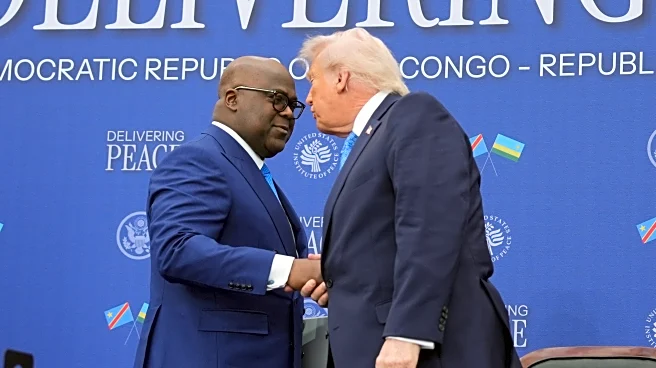What is the story about?
What's Happening?
Somalia is experiencing a significant increase in diphtheria cases and deaths, exacerbated by vaccine shortages and reductions in U.S. aid. Somali officials report over 1,600 cases and 87 deaths this year, a sharp rise from the previous year. The disease, which primarily affects children, is preventable with vaccines that are currently in short supply due to global shortages. The U.S., previously a major donor, has cut foreign assistance, impacting Somalia's health budget and leading to the closure of health centers and mobile vaccination teams. The U.S. aid commitment to Somalia has decreased from $765 million to $149 million, affecting the distribution of vaccines and healthcare services.
Why It's Important?
The surge in diphtheria cases in Somalia highlights the critical role of international aid in supporting healthcare systems in developing countries. The reduction in U.S. aid has led to a decrease in healthcare services, leaving many children unvaccinated and vulnerable to preventable diseases. This situation underscores the importance of sustained international support and the potential consequences of aid cuts on public health. The closure of health clinics and reduced vaccination efforts could lead to further outbreaks of infectious diseases, posing a threat to regional stability and health security.
What's Next?
Somalia's government plans to launch a vaccination drive, although details are yet to be provided. The international community, including other major donors like Britain, France, and Germany, is also reducing aid budgets, which may further impact Somalia's healthcare system. Advocacy for increased humanitarian efforts from other nations is crucial to address the healthcare crisis. The Somali government faces criticism for its limited health sector funding, and there is a need for strategic planning to improve vaccination coverage and healthcare access.
Beyond the Headlines
The diphtheria outbreak in Somalia raises ethical concerns about global health equity and the responsibility of wealthier nations to support vulnerable populations. The situation also highlights the challenges faced by countries with limited resources in managing public health crises. Long-term solutions require international collaboration and investment in healthcare infrastructure to prevent future outbreaks and improve health outcomes.
















